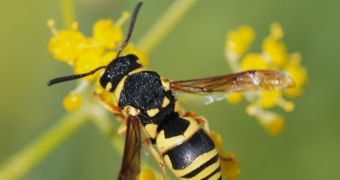Experiments carried out by a team of researchers with the Institute for Biomedical Research in Barcelona, Spain, bring new hope to people diagnosed with various types of cancer.
During these experiments, the scientists used wasp venom to kill cancer cells. Although the tests were carried out in laboratory conditions, it is believed that wasp venom could one day be used to treat human patients.
Writing in the Journal of Controlled Release, the specialists behind this series of in vitro experiments detail that the compound they used to kill cancer cells was a peptide extracted from wasp venom.
This naturally occurring peptide is well capable of entering one cell or another. Having worked its way through the cancer cells' protective membranes, it quickly triggered their death, Science Daily informs.
As explained by specialist Miguel Moreno, “This peptide has the ability to form pores in the cell plasma membrane, penetrate into the cell and finally cause its death, either by necrosis or by triggering apoptosis, programmed cell death.”
In their paper in the Journal of Controlled Release, the scientists say that, as efficient as it might be when it comes to killing cancer cells, the wasp venom peptide that they toyed with during their experiments is fairly toxic.
Hence, it cannot simply be delivered into one organism or another. This is because it would not discriminate between healthy cells and tumor cells, and attack them both. Consequently, it would not make a very patient-friendly treatment option.
To solve this problem, the researchers had to come up with a means to transport the peptide straight into tumor cells. The system they developed and tested was a carrier comprising a cancer cell receptor and the wasp venom peptide.
In laboratory tests, the carrier performed surprisingly well, meaning that it delivered the wasp venom peptide to the cancer cells the researchers were looking to kill. Healthy cells that chanced to cross its path, on the other hand, remained unaffected.
The Institute for Biomedical Research scientists say that, although the outcome of their experiments into the potential use of wasp venom to treat cancer are promising, it will probably be a while until this treatment option becomes available to the general public.
More precisely, they explain that, before they even begin considering using this peptide to treat human patients diagnosed with cancer, clinical trials involving animal models must be carried out. Presently, the researchers are looking into the possibility of studying this cancer treatment option on mice.

 14 DAY TRIAL //
14 DAY TRIAL //